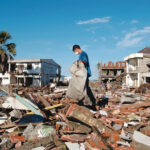Femi and his friends were playing in the compound of their home with rubber bands and suddenly it hit him in the eyes. The pain made him cry and run to his mummy cooking in the kitchen. The eye had turned red and was bringing out water.
Apparently, Femi’s discomfort made the mother to quickly take him to a chemist shop nearby, where he was given eye drops and painkillers. Unfortunately, the pain did not subside all through the night and the next morning, Femi had to be taken to the clinic. Months passed, but Femi started having problems seeing with the eye due to the injury caused by the rubber band.
Henry’s eye injury occurred when a broomstick shot as a missile with a rubber band and/or catapult sling by his siblings while at play hit his left eye.
In developing countries, eye injuries are not only more common but with more severe consequences due to socioeconomic background, lack of optimum treatment facilities, use of traditional eye medication and poor education.
Eye injuries may occur at play, work, school, home, or on the road. It occurs in children up to the middle age, especially in males. Objects causing injury to the eye might be blunt or sharp such as cane, fist, sporting equipment, explosives, missiles, stone, catapult, broom stick, pencils, knives, toy guns among others.
The broomstick, for instance, can also become a foreign body lodged within the eye from this process. The broom is very dirty because of its usage and thus acts as a reservoir for many germs such as bacteria and fungi, leading to fulminating infection of the eye.
There has been a recent increase in the number of eye injuries from blunt objects like broomstick and rubber band injury in children presented in hospitals across Nigeria. Broomstick is a pointed sharp object that can easily penetrate the eye, especially when shot as a projectile.
Over a 10 year period, a total of 20 children with an age range of one year three months to 14 years were treated for eye injury from broomsticks at the University of Benin Teaching Hospital (UBTH), Benin City.
Twelve children (60%) sustained eye injury from a rubber band used for shooting broomsticks by other children and siblings while at play. Two of the children sustained the injury from beating (flogging) with a broom by their teacher and parent and one child got injured from poor handling of the broom at chores.
The researchers, in the Nigerian Journal of Surgery, said 10 children (50%) presented within 24 hours of occurrence of the injury. Nineteen of the children were blind at presentation in the affected eye with visual acuity ranging from count finger to no light perception.
The Eye clinic in Olabisi Onabanjo University Teaching Hospital (OOUTH), Sagamu, between January 2007 and December 2011 also witnessed injury from stick as the most common agent of eye injury, followed by slap.
Also, blunt objects (57%) were the most common cause of eye injury in the 89 patients that presented over a 5-month period at the two Teaching Hospitals in Enugu State. Most of them had a combination of pain with loss of vision.
These were the University of Nigeria Teaching Hospital (UNTH), Ituku/ Ozalla, Enugu and the Enugu State University of Science and Technology Teaching Hospital (ESUT TH), Park Lane, Enugu.
The commonest domestic injuries were sustained from a fist or an open hand (26%). Other agents of domestic trauma included sticks/wood (23%), bottle caps (6%) and pen/pencils (6%). It was in the 2021 edition of the journal, BMC Ophthalmology.
Dr Olufunmilola Ogun, an eye specialist at the University College Hospital (UCH), Ibadan in a five-year review of eye injuries that occurred at home seen at the hospital also named corporal punishment to account for a significant number of non-accidental domestic eye injuries.
Unfortunately, eye injury in children in Nigerian society is a tragedy that is preventable, said Dr Henrietta Monye, an eye specialist at the Eleta Eye Institute, Ibadan. “Many eye injuries in children in our society are not due to an accident but negligence and many home environments are not safe for children.”
Dr Monye said an eye injury, for instance, shouldn’t occur as a result of corporal punishment since there are alternatives and more efficient means of grooming and disciplining a child because once a child loses vision in that eye, it is really a tragedy for life.
“If one has not seen a victim of eye injury as a result of for instance corporal punishment, one would not understand the consequences or the magnitude of the type of problem that it really is,” she added.
However, Dr Monye warned that eye injury may lead to visual impairment if it is not promptly referred to the ophthalmologist for appropriate care and to prevent complications.
“It is important to go to the hospital as soon as possible because it’s only a qualified eye professional that can check the patient very well and tell you what the next step would be. The patients usually may require surgery, but the most important thing is to get the care that you need because it’s a case of the earlier you come the better the outcome.
“For a penetrating injury, if someone doesn’t seek care soon enough, the eye may become infected and the chances of that eye seeing might be lost.”
Also, Dr Monye recommended that effective health education be used by eye health stakeholders to highlight these risks from brooms and rubber bands, being common household implements. Parents and caregivers should also be enlightened on these risks and the need for enhanced supervision of children especially at play.






